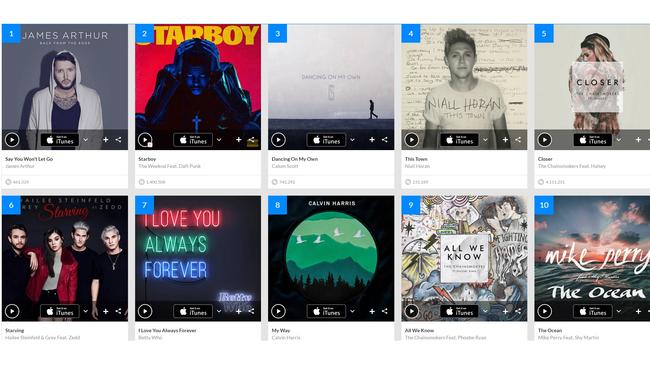Why you probably hate every radio station at the moment
IF YOU find yourself lamenting how epically bad music on the radio is at the moment, you’re not alone. And there’s a very good reason for it.

OPINION
WHENEVER I’m driving along, flicking from station to station on the radio, I find that I almost never find a new song that I like.
Hit and Nova can usually be found playing the exact same Justin Bieber song at the exact same time, and down the “indie” end of the FM band, Triple J are either playing something bland (a 16-year-old girl warbling like Sarah Blasko, who hasn’t bothered to write a chorus) or extremely annoying (Death Metal at lunchtime? Really?).
Why can’t any of these radio stations consistently play good, new music?
My Dad, like many of his fellow Baby Boomers, reckons “it didn’t used to be this way”, and that radio has gotten worse because my generation “just doesn’t have any artistic talent”.
He’s wrong. Good songwriting didn’t spontaneously leave planet earth just after John Lennon died.

The problem is that, with the internet and social media, the whole pop music machine has broken down.
I’ve worked in radio stations and in music journalism, and have seen first-hand how difficult it has become to figure out what music people want to listen to. Fifteen years ago, if you were programming top 40 music, you pretty much just had to check the record sales. People wanted to listen to the music they were willing to buy.
But today, only people too old for the internet buy CDs. If we still used physical sales as an indication for “hit” songs, we’d have nothing but Michael Bublé and Anthony Callea on the wireless.
Now, charts are determined by streaming sites like Spotify and Apple Music. This is a massive problem for programming new music on the radio. Music streaming charts don’t show what new music people are excited about. Instead, they show what music is being played most often.

The charts have moved away from “what people are buying” towards “what people are listening to”. This is terrible for pop music, because it means the most successful songs today aren’t the ones people are excited about, but the ones featured on corporate playlists for gyms, supermarkets, clothing stores, bars, offices and coffee shops.
These playlists don’t change for months at a time, and put the same bland, inoffensive songs on the charts again and again.
In the old system, a song might be number one this week, and off the charts the next. There was heaps of variation, and totally unheard of artists could break onto the charts if they had a great tune. On the streaming charts, however, you get only around one new song into the top 40 each week. Sale-driven pop charts were dynamic and fresh. Streaming-driven charts are old and stale.
Only a decade ago, bands like The White Stripes or The Arctic Monkeys could get onto commercial radio and win huge audiences. That doesn’t happen anymore.
New, worthwhile alternative acts find it harder than ever to break into the mainstream and, as a result, hit radio is more boring than ever.

Commercial music DJs have to play songs which, statistically, will be enjoyed by the widest possible audience. That’s what they get paid to do. It just so happens that, because of the internet, those statistics are generating terribly tedious tunes.
The alternative is Triple J, which isn’t driven by statistics at all. Instead, it is picked by a small group, insulated from popular opinion.
Much of the time, this is fantastic: there’s a station which will broadcast interesting, brave new music. The rest of the time, it’s unlistenable: e.g. Minimalist Electro and Australian Hip Hop (with notable exceptions for SA’s Tkay, Allday, and Dialect).
My Father and the rest of the Baby Boomers are wrong — the young folks are making wonderful music. Listening to the radio though, you can see where they’re coming from.
Much of the best music from my generation isn’t making it to the radio. If you have the time to spend hours searching the internet, going through blogs, and chasing unknown artists, there are some truly excellent acts out there.
There’s a good reason that the Hottest 100 is Triple J’s is the most popular event, not just on trips jeezy, but also on any radio station in the country: it’s now the only day when radio plays the songs people actually want to hear.
When people had to pay for music, that’s what the radio was like every day of the year. Now, we get it for a single day. Until somebody figures out how to make music charts work again, we’ll just have to keep gritting our teeth for the other 364 days.
James McCann is a writer and comedian. Find him at jamesdonaldforbesmccann.com or follow him on Twitter @jdfmccann.



